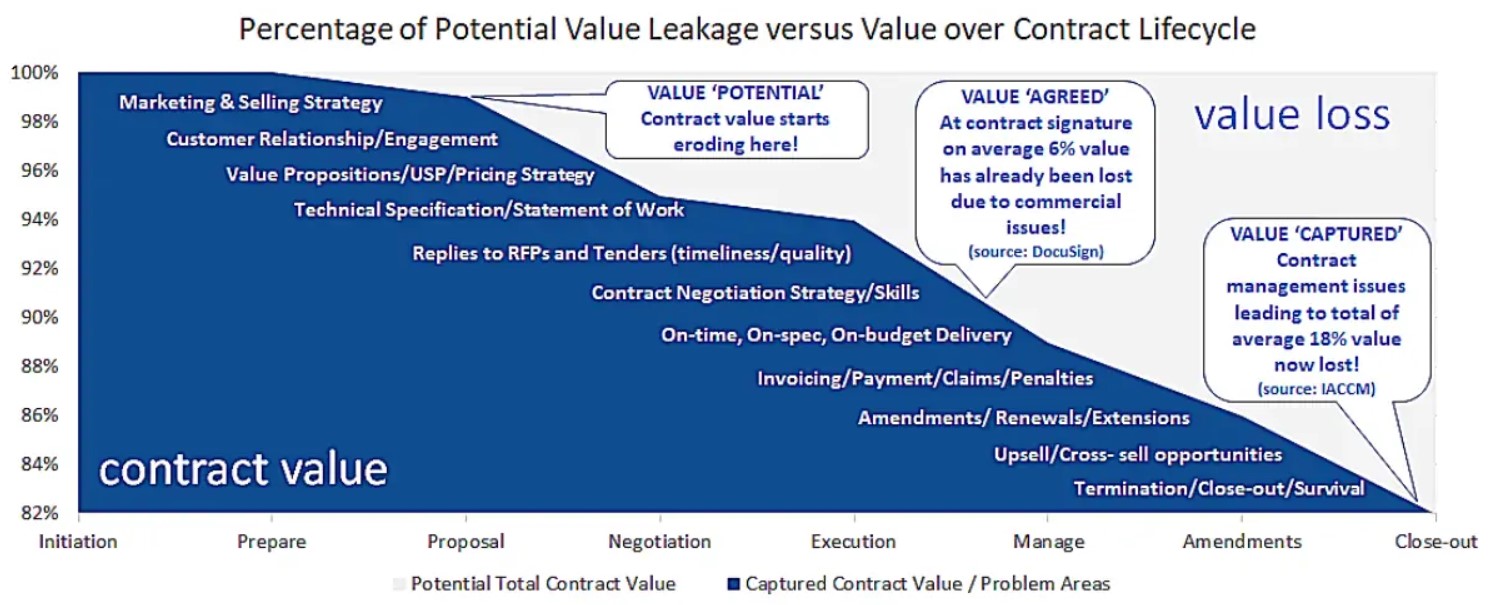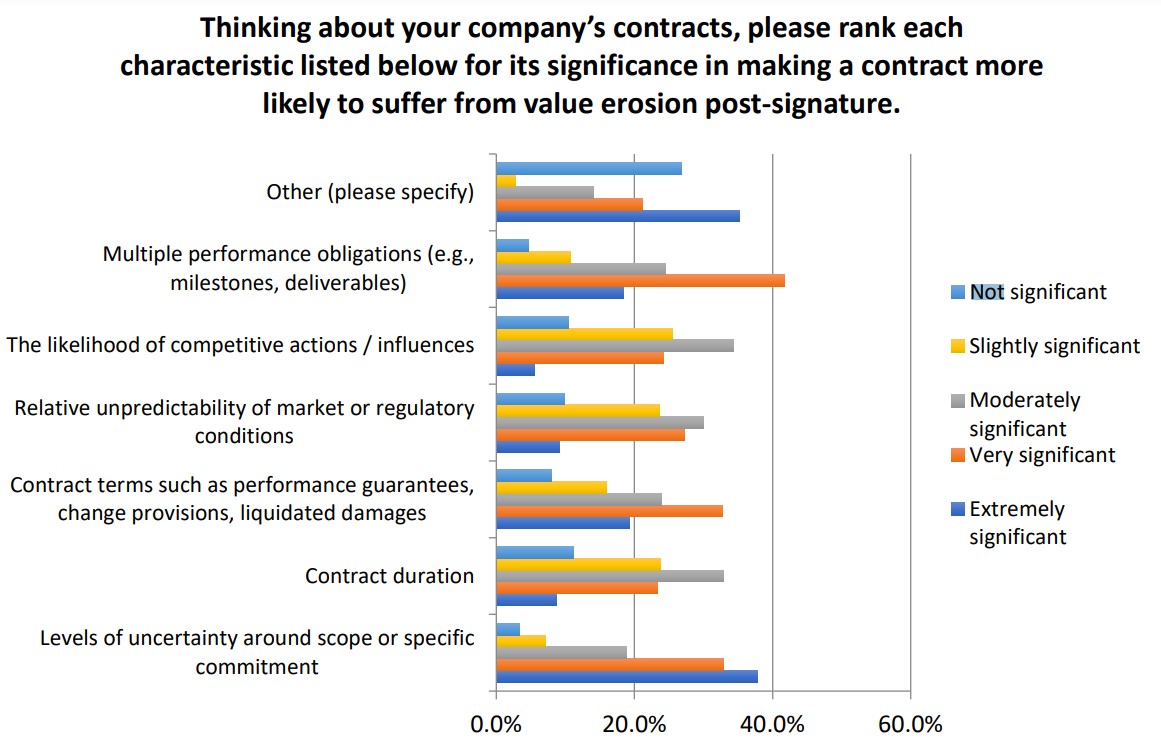5 Strategies to Plug Contract Value Leakage
February 9th, 2023
How much of your contract value is lost between inception and deliverables? If your organization is like most, you experience significant contract value leakage, which can adversely affect profitability. To retain as much contract value as possible, you need strategies to minimize contract value leakage – and we have five strategies to help you reduce the flow.
Key Takeaways
- Contract value leakage reflects the amount of value lost over the life of a contract.
- Missed deliverables, unclear contract language, and unacceptable contract costs are causes of contract value leakage.
- To reduce contract value leakage, use standardized clauses and language, hold down internal costs, fully understand all contract language, and closely monitor all deliverables.
- The most effective way to minimize contract value leakage is to employ automated contract lifecycle management software.
What is Contract Value Leakage?
Contract value leakage reflects how much value is lost over the life of a contract. It’s measured by subtracting the actual value realized from the expected value of the contract.
According to World Commerce and Contracting (WCC), the average contract loses more than 9% of its expected value post-execution – with even more leakage occurring before the contract is signed.

What Causes Contract Value Leakage?
Many factors can cause the value of a contract to erode over time. Most of these factors are the result of poor contract management.

SOURCE: https://www.worldcc.com
Contract Deliverables
Missed milestones and deliverables may be the biggest factors in contract value leakage. In World Commerce & Contracting’s Tackling Erosion: Restoring Value to Your Contracts report, more than a third of contract professionals say that on-time delivery issues are very significant in eroding contract value.
When the other party misses deliverable deadlines, contract values suffer. Missed milestones lead to missed opportunities and resultant increased opportunity costs, which erode the value of a contract and reduce expected profits.
Further value erosion occurs if the other party fails to deliver or delivers less than was contracted for. This can manifest itself in terms of the following:
- Fewer products delivered
- Products or services delivered at a higher price
- Lower-quality products or services supplied
Deliverable issues are often the result of poorly managed contracts. Without someone on your side holding the other party to its contractual obligations, some parties will choose to underdeliver – which causes your contracts to underperform.
Contract Clarity
Some contract erosion occurs at the very beginning of the contract process. If a contract isn’t clear on what should be delivered, when, or for how much, the expected value is bound to be affected. A lack of detail can result in unexpected charges, more work required on your end, or disappointing deliverables.
Unclear contract language is often the result of a lack of contract standards. It can also happen when untrained or unqualified employees write their own contracts without proper oversight and review. You can’t blame the other party for exploiting loopholes when your side enables them in the contracts they create.
Contract Costs
It costs money to create a contract, but those internal costs are often not considered when calculating a project’s return on investment. The more complex the contract, the more time your contracting and legal departments invest. A contract with slim margins can actually prove unprofitable when you calculate all the costs involved.
How to Minimize Contract Value Leakage
What steps can your organization take to reduce contract value leakage? There are five primary strategies to follow.
1. Use Standardized Contract Clauses and Language
To avoid unexpected results, make sure all your contracts have a solid foundation. Don’t let rogue employees or departments write their own contracts.
Base all new contracts on a set of approved clauses and terms using standardized language. The best way to do this is to create a library of pre-approved contract templates, along with a set of terms and clauses that meet your organization’s standards. When you standardize the writing of your contracts, you’ll minimize any surprises you might encounter later in the process.
2. Work Efficiently to Hold Down Internal Costs
Every hour your legal and management staff spends reviewing a contract increases the internal cost of that contract. Besides, having too many people involved in a contract tends to slow down the process.
Do you really need all those people reviewing every contract you create? You might if you create every contract from scratch. If you start with standardized language and templates, however, you probably don’t need as much oversight later in the process. This improves efficiency and reduces costs.
3. Make Sure All Stakeholders Evaluate the Contract
While you can work to reduce the number of individuals involved in contract creation and review, you need to ensure the right individuals evaluate a contract – and understand all the details. The better your organization understands a contract, the less likely value-sapping mistakes will occur.
Make sure all the important details are understood and acceptable, including:
- Details of deliverables
- Deliverable dates
- Each party’s responsibilities
- Penalties for missed deadlines
4. Closely Monitor Contract Deliverables
Even the most tightly written contract can leak value if no one monitors deliverables and deadlines. The contract process doesn’t end when a contract is signed. The contract’s entire lifecycle has to be managed to ensure both parties deliver what they promised when they promised. You need to set up a system that monitors deliverable schedules and alerts key management when deadlines are approaching and when deadlines are missed.
5. Automate the Process with Contract Lifecycle Management Software
The most significant thing your organization can do to plug the leakage of value from your contracts is to automate the entire process. Contract lifecycle management (CLM) software automates all the strategies discussed here and more, keeping contract value leakage to a minimum.
Consider all the things that CLM software can do for your organization:
- Automate and standardize contract creation with contract templates and clause libraries
- Automate contract workflow and reviews
- Automate contract execution with e-signatures
- Store all contracts in a centralized digital repository
- Automate deadline and deliverables tracking
- Enable robust reporting and analytics
It’s clear that if you want to plug contract value leakage, embracing CLM software is the best solution.
SOURCE: Scope Training via YouTube
Contract Logix: The Ultimate Solution to Contract Value Leakage
To minimize contract value leakage, turn to the contract automation experts at Contract Logix. The best way to reduce value erosion is to automate the contract process. Our CLM solution automates the entire contract creation process, from creation through deliverables and beyond. You’ll retain more of your contracts’ value and realize a more efficient, more accurate, and less costly process.
Contact Contract Logix to start minimizing contract value leakage with CLM software.
Looking for more articles about Contract Management? Check out our previous article “Automating Work Requires a Surprisingly Human Touch“.
Accelerate Your Digital Transformation With Contract Logix
Download our Data Extraction Product Brief to learn how you can automate the hard work using artificial intelligence


